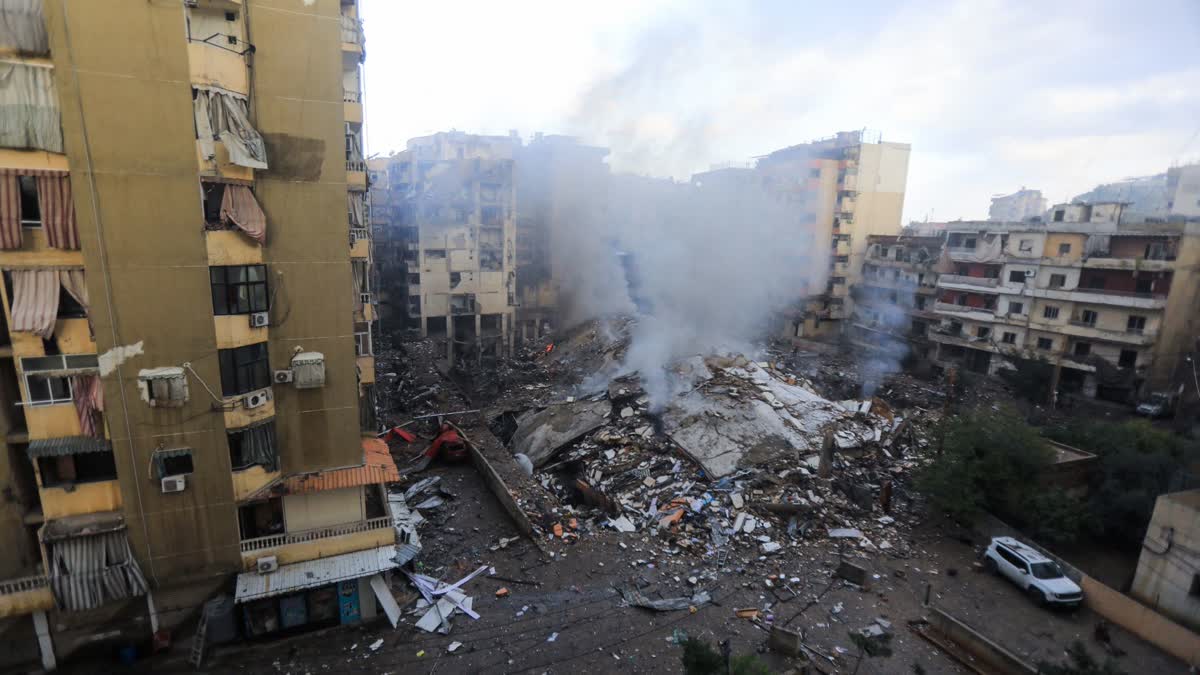New Delhi: As tension escalates in West Asia and with the new phase of conflict between Israel and Hezbollah, the international community is now at a critical juncture as geopolitical challenges loom large.
Israel has continued bombing Hezbollah targets even after the elimination of the Hezbollah chief Hassan Nasrallah. Israel has clearly said that it will not stop the attack and will destroy any country that attacks Israel's interests.
This conflict that started between Israel and Hamas has reached Lebanon and the possibility of Iran's involvement in it has also increased. What effect will this have on India and its people?
Experts view
Meena Singh Roy, former Fellow & Head West Asia and Eurasia Centre, MP-IDSA, said, "I believe the current concern is that Iran may potentially become involved in the conflicts in the region. There seems to be a reluctance for conflict from both the main players and regional countries, but caution is necessary when considering Iran's position. Israel holds significant military power and receives support from the United States".
"It's unlikely that anyone other than the United States can exert enough pressure on Israel to facilitate a resolution and de-escalation. Prime Minister Netanyahu might view this as an opportunity to weaken Hezbollah, a significant threat to Israel's security. Therefore, India's primary concern is the escalation of the conflict", added Roy.
"In terms of India's interests, stability in West Asia is crucial for energy security and the well-being of Indian citizens working in the region, especially in the Gulf. The conflict between Israel and Hezbollah is not expected to have a direct impact on India's economy or its citizens in the Gulf Cooperation Council (GCC) countries. However, the situation in Lebanon, Iraq, Iran, and Yemen may have different implications", further said Dr Sima Baidya, Assistant Professor, Centre for West Asian studies, JNU.
She added, "I don't foresee a war in West Asia. Despite India's positive relations with Israel and its historical ties with Iran, the aggressive actions of Israel and the lack of diplomacy are concerning. On the other hand, despite numerous provocations, Iran has not taken any significant actions, which has further escalated the situation".
"Iran has a strong ideological and practical connection with Hezbollah and other groups. While this does not directly impact India, it is a global concern. India maintains a neutral position, neither mediating nor taking sides against Israel or Iran. India always advocates for peace, making the conflict a major concern not only for India but also for the global community", said Baidya.
When asked if the conflict would impact Indian economy and people living abroad, Meena Singh Roy further said, "If the conflict escalates, it could pose a significant risk to Indians living in the Gulf. The situation is unpredictable, but I hope that it does not lead to a major regional war. Nobody desires that outcome".
She pointed out that the ongoing conflict would pose economic challenges for India due to its substantial interests in the region.
"Connectivity projects have already been affected by economic issues and sanctions. Additionally, the fallout from the Ukraine-Russia war and the tensions between China, the US, and Russia have direct and indirect impacts on various projects and issues, including the India Middle Europe Economic Corridor (IMEEC). The conflict in Gaza has slowed down this corridor, making the Gulf a major challenge for India", Meena Singh Roy explained.
Commenting on the recent killing of Hezbollah Chief, Singh said, "The current strategy seems to be the best available for Israel and Prime Minister Netanyahu. Despite the stated goals, the situation in Gaza has not resulted in the release of Israeli hostages or complete Israeli control over the territory. It's well known that Iran provides direct financial support to Hezbollah and has complete backing from the US. The US may not take significant action until November, providing a window of opportunity for Prime Minister Netanyahu to act. The primary objective seems to be to secure the northern side for Israeli citizens to return, regardless of the actual outcome".
What's at stake for India?
India and the Middle East have a long-standing trade relationship, characterized by significant economic ties across various sectors. The Middle East is a major supplier of crude oil to India, making it a critical component of India's energy security. Bilateral trade has been substantial, with India importing not only oil but also natural gas, petrochemicals, and fertilizers. In return, India exports machinery, textiles, and pharmaceuticals.
There is growing investment from the Middle East in Indian infrastructure, technology, and startups. Similarly, Indian companies are investing in sectors like construction and hospitality in the region.
The trade relationship is influenced by geopolitical dynamics, including India's strategic partnerships with countries like the UAE and Saudi Arabia.
India is exploring free trade agreements (FTAs) with several Gulf countries to enhance trade and economic cooperation. The India-Middle East trade relationship is poised for growth, driven by mutual interests and economic integration.
About 90 lakh Indians work in Gulf countries. India's bilateral trade in the Middle East is worth 195 billion dollars, that will also be affected if the conflict continues. Investment also comes from there, which will have a direct impact.
